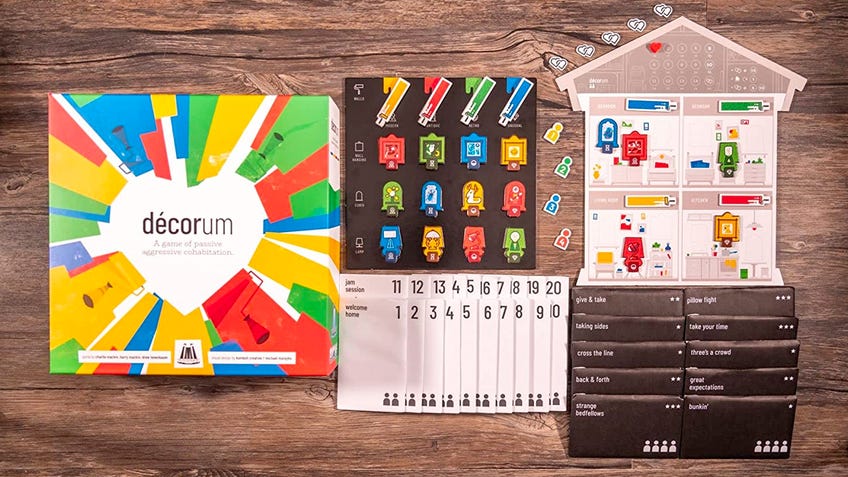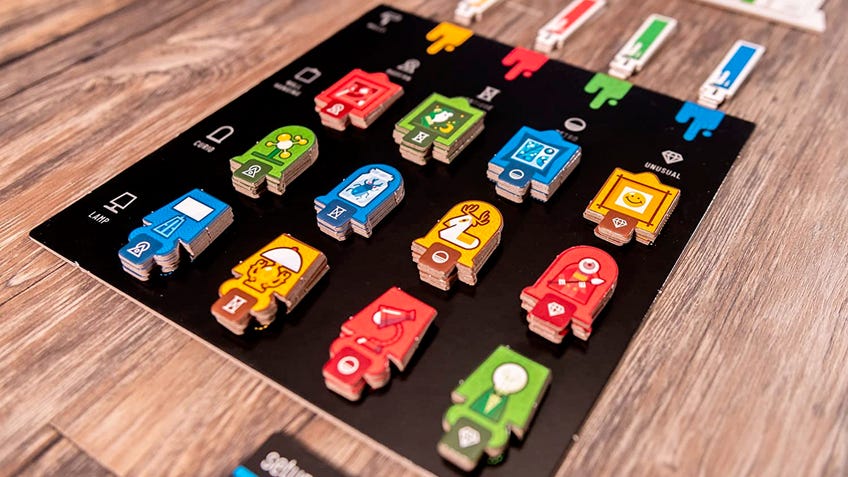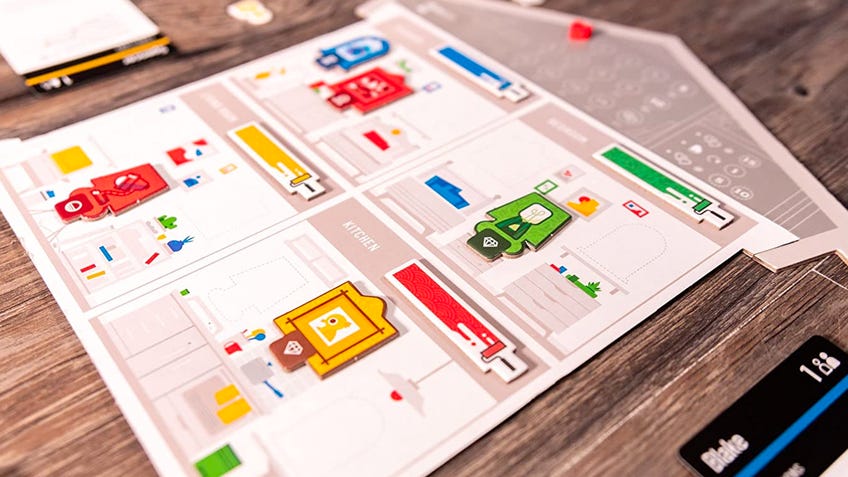Passive-aggressive decorating co-op Décorum is an unlikely contender for one of 2022’s standout board games
I LOVE that.
As anyone who has shared a home with someone knows, cohabiting can be a test of communication. Differing opinions on everything from aesthetics to can lead to a wrestle between personal preferences, often played out in tiny non-confrontational battles. The shifting of a lamp by a few inches. The decision to fold a blanket over the arm of a sofa rather than the back. Storing something in this cupboard rather than that one.
Décorum is a board game that finds its entertainment and tension in this passive-aggressive push-and-pull of people’s clashing tastes. Having played the recent release at this year’s Gen Con, I found it to be one of the most surprising and downright enjoyable board games of 2022 so far.
Like the small adjustments of decorations on a shelf, Décorum’s satisfaction sneaks up on you. The relatively unassuming box declares it to be “A game of passive aggressive cohabitation”. As you unpack, its components are fairly sparse. A central board depicting a four-room house, tokens representing paint colours and three types of objects - lamps, curios and wall hangings - in four different styles: unusual, retro, modern and antique.

Then, you realise this is a campaign game. There are over two dozen envelopes, each numbered with a different scenario. (A planned mobile app will offer even more digital scenarios to avoid the box running dry.) The missions are split between those for two players and those for bigger groups. Like Pandemic Legacy and Gloomhaven, there are larger packets that command “DO NOT OPEN” in all caps until you reach a certain point in the campaign.
The players’ conditions overlap in some ways, collide in others.
You open the first scenario and discover your characters for the next half-hour. In our case, we became Spencer and Blake, a couple moving in together for the first time. A shared setup card specifies the starting wall colours of your home, along with the items and styles found in each room. On separate cards for each character, each player has a brief bit of dialogue to read aloud, then silently reads their own secret win conditions.
These conditions are where Décorum finds its magic. The players’ conditions overlap in some ways, collide in others. One character may insist on having two red rooms, while the other can’t stand warm colours - red and yellow, as opposed to cool green and blue - upstairs. One character wants retro objects in every room, but the other refuses to have lamps on the left side of the house. Solving the puzzle together without being able to reveal your specific requirements becomes the goal.
Playing is simple. On their turn, each player can add an object, remove an object, swap an object’s style or paint one room a different colour. With three or four players, things are complicated by the introduction of housemate tokens that place the players into the house itself, requiring them to move between rooms and ensure their current room aligns with their demands. The turns alternate until all players have simultaneously fulfilled their objectives. That really is it. Except it really isn’t.
Like Magic Maze, The Crew, The Mind and other games played (almost) without a word, the palpable silence enforced by the rules attempts to hold back the laughter, groans and sharp intakes of breath as the players feel their way around each other’s hidden conditions. A player may find themselves swapping an antique lamp for a modern one, unaware that they’ve unravelled their partner’s attempts to have a different style in every room. Someone might paint a room blue, only to quickly find their work repainted in green to ensure an even spread of colours through the house.

In lesser hands, it could become an exercise in frustration and guessing. Décorum manages to defuse any irritation and find a comedy of errors in its simple premise. Key to its hugely entertaining atmosphere is the ability for each player to respond after their counterpart’s latest decoration, providing a positive, negative or neutral comment - without indicating anything more. Being able to shout “I LOVE that!” when your partner finally stops trying to hang a painting in the kitchen or seethe “Why have you done this?!” as they undo your careful arrangement of antique curios provides a constantly entertaining drip feed of information and a way to embody the delightful roster of demanding oddballs presented by each scenario. To avoid things going in circles for too long, later rounds allow players to reveal one of their hidden conditions in a two-player “heart-to-heart” or group “house meeting”, eking out a little more direction without ever making things too easy.
Décorum manages to defuse any irritation and find a comedy of errors in its simple premise.
Décorum’s writing is kept spare but sharp, handing just enough to the players to make the game feel thematic and engaging, elevated far above its simple “decorate a house” foundation. In one scenario, you might be a pregnant secret agent literally trying to save the world through interior design - despite the efforts of her colour-splashing Bob Ross-like artist partner - while another casts you as a decidedly cool roomie and his uncool try-hard housemate who misunderstands what’s hip. It’s all unnecessary background for a game about placing objects in rooms, but it’s a prime example of how Décorum creates something magical from the mundane.
Décorum is a bright splash of paint on a plain wall, taking a simple set of rules, components and premise and turning it into something vivid. After we finished the first scenario, we immediately played the second. Then the third. Then the fourth. We didn’t stop there. Who would’ve thought that decorating could be as all-consuming as bingeing a Netflix series?
While there are many more scenarios left in the box, everything I’ve played of Décorum so far positions it as one of 2022’s best hidden gems to seek out. It’s the social interaction and puzzle-solving of board gaming at its peak, wrapped up in a game about where you place a lamp.


